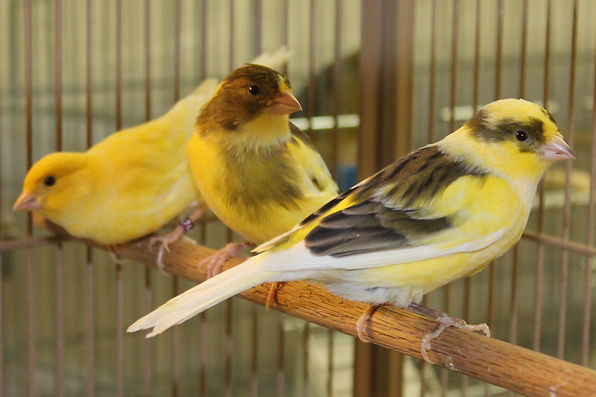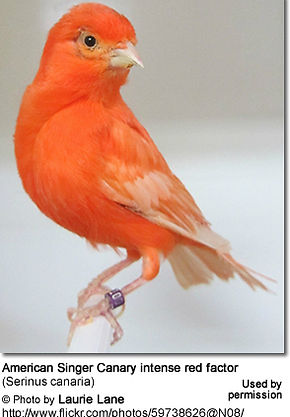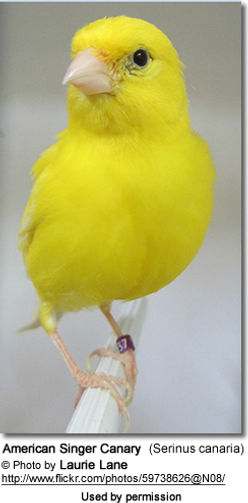Serinus canaria
The only canary developed in the United States, the lovely American Singer Canary is considered to be the best canary pet!




The American Singer Canary is not only pleasant to the ear with its melodious song, but pleasant to they eye as well with its striking beauty. By crossing the Border Canary known for its pleasing appearance with the smaller Roller Canary known for its beautiful song, the result was this unique and wonderful bird. A delightful attractive canary with a widely variable song that is sweet and pleasing to the ear, the American Singer is the best of both worlds.
Being an active lively little canary, the America Singer Canary is a good choice for both the beginner and the seasoned keeper. It is strong, hardy, and easy to care for. It is also usually a good breeder and comes in a wide variety of colors.
The American Singer Canary is classed as one of several well known "song canaries", bred for song rather than physical appearance or color. Shows for these birds are of a different nature than shows for other canary types. Basically being entered into singing contests these canaries are bred with the goal of achieving winners with the best balance between quality and variety of song. Each breed has a distinctive song and a well-defined song standard. Some of the other well know song canaries include: the Roller Canary, Spanish Timbrado, the Russian Singer Canary, and the Waterslager Canary.
Scientific Name: Serinus canaria domesticus
Distribution:
The American Singer Canary is a newer breed of canary. It was developed in the 1930's when a group of women who became known as 'The Eight Boston House Wives" dreamed up the idea of a canary that was both pleasing to the eye and had a beautiful song. They organized a breeding organization devoted to the development of this bird, originally known as the "North American" canary . The canary breeds combined to originate this marvelous breed are the German Roller Canary (30%) and the Border Canary (70%).
This is the most widely spread canary breed in America today. Many of the 'kitchen' or 'common' canaries found in the United States are descendants of this breed, though only a true breed American Singer will be banded noting it as a pure-bred.
Description:
Though the American Singer Canary is classified as a "song canary", it is also bred for its appearance. It is a fairly small robust bird reaching a length of about 5 3/4 inches (14.6 cm). They come in a wide variety of colors including yellow, white, buff, green, blue, orange, bronze, brown, fawn, and variegated.
The song of this canary is also of prime importance. The American Singer uses both rolled and chopped notes giving them a very wide variety of song. In showing however, they are judged mainly for their capability to render a song that is pleasing to the ear. It should have just the right amount of blending of roller and border for a pleasant song that is not too loud, harsh, or monotonous.
Canaries of both sexes can begin to sing a weak song as early as four weeks, but females usually don't sing after about six months and won't have the full long song of a male.
Care and feeding::
Canaries like wide open spaces so provide a roomy cage. Provide a cage with vertical bars and small perches of different size for foot exercise. Have at least 1 perch set high in the cage for the canary to roost (sleep). The cage should be placed high, so the canary can look down on us so to speak.
Canaries eat mainly canary seed and rape seed. Vitamin coated canary seed mixes are readily available at a pet store. Greens are also enjoyed and can be offered daily along with a little calcium in the form of a cuttlebone.
They do like to bath, so should be offered a bird bath. Cage cleaning and toe nail trimming is about all the maintenance canaries need.
See About Canaries: Housing and About Canaries: Care and Feeding for more information.
Social Behaviors::
Canaries are good-natured social creatures that do well when kept in cages or in aviaries. They are timid birds though and should not be housed with parakeets, lovebirds, or other hookbills that tend to be more aggressive birds by nature.
Male canaries should be kept in a cage by themselves to ensure quality singing. Males can be territorial and pairing up with two male canaries in a cage can cause fights. In a spacious aviary canaries can generally be housed with other canaries, finches, and other hardbills.
Activities:
Canaries do not require toys, mirrors or any other form of entertainment, a swing is all they need to keep themselves occupied. Most of the time, canaries are simply enjoyed for their beauty and singing. However, some canaries are allowed out of their cage to perch or are show canaries and therefore require taming or training.
See About Canaries: Handling/Training for information on taming and training.
Breeding/Reproduction:
he American Singer Canary is generally easy to breed. Most canaries breed easily and readily if provided with quality food, lighting, secure surroundings, and conditioning. Breeding season for most canaries is usually from December to April. They are best bred in breeding cages.They lay their eggs in a nest. The female will lay 3 to 6 eggs, one per day. It is best to allow a hen to have only two clutches.
See About Canaries: Breeding/Reproduction for more information on breeding.
Potential Problems:
These birds are hardy and healthy if provided with a good environment and a good diet. Avoid an environment that is wet, cool, and drafty.
See About Canaries: Potential Problems for information on health.
Availability: American Singer Canaries were developed in the United States and are not available elsewhere. Often they are available at pet stores, and they can also be readily found through bird shows, bird clubs, breeders, and on the internet.
Authors: Clarice Brough, CAS
Additional Information By: Denise Taormina
American Singer Canary Male singing
American Singers Canaries
Champion amirecan singer canary
American Singer Canary Species
American Singer Canaries
courtesy to : www.beautyofbirds.com/americansingercanaries
he outgoing and popular American Singer Canary is a type of song canary developed in the United States to enhance the freedom, variety, and melodiousness of its song.
This canary is a cross between the Border canary (1/3) and the German Roller canary (2/3) -- enjoying the best traits of both of these traids, specifically the musical song of the roller and the pleasing look of the canary.
Its song is louder than the Roller's -- but softer than the Border Canary's.
Recent breeding successes have yielded songsters with remarkable variety, and melodiousness.
Exhibition birds are judged for both the quality of their songs and conformation.
The combination of quality of song and attractive appearance has caused the American Singer canary to become one of the most popular canaries in the United States.










Three things should remain foremost in one’s mind when treating illness in canaries. First, do no harm. Taking a shotgun approach can cause more harm than good and if by chance one of the treatments works, one is left with the question of which treatment or combination of treatments was effective. Second, always start with the simplest causes and treatments and work out from there. Third, the old adage that an ounce of prevention is worth a pound of cure is absolutely correct and the importance of prevention cannot be overstated.
The single treatment that one can apply to any illness is supportive care- providing warmth, reducing stress and isolating the bird from other birds. Often this will be all that is required to allow a basically healthy bird to recover.
For more in-depth discussion of health-related issues in canaries, check out The Practical Canary Handbook- a guide to breeding and keeping canaries
-
Signs of Illness
-
Stress
-
Loss of Song
-
Diarrhea and Loose Stools
What are signs of illness in a bird?
-
Appetite changes- eating more or less than usual
-
Behavior changes such as sleeping more often or being less active than normal. (This change in behavior is normal during the molt.
-
Weight changes
-
Change in droppings- becoming looser, changing color or reduction in number. Fewer droppings can be one of the first signs that a bird’s appetite is off.
-
Increased drinking of water not explained by hot weather, increased exercise, or eating salty foods or those high in water content such as greens, cucumber or watermelon.
-
“Fluffed up” appearance
-
Prolonged molt or absence of molt (unhealthy birds will not molt), ragged or sparse-looking feathers, bare areas where feathers do not regrow
-
Loss of song or hoarseness
-
Sneezing, coughing, labored breathing, tail bobbing up and down with each breath
-
Nasal discharge
-
Eye discharge or swollen eyelid
-
Favoring a foot or leg
-
Swellings or growths
-
Sitting drooped on perch or sitting on the floor of the cage
-
Droppings stuck to the bird’s vent area
Stress :
One of the most important causes of disease in canaries- and one of the least understood by many pet owners- is stress. Transporting, catching, overcrowding, chilling, being placed in a drafty location and poor nutrition are all stressors which can lead to illness. Any steps which can be taken to reduce stress on a bird will be beneficial- darkening a room and removing perches from a cage will minimize the stress of capture, for example.
Loss of Song :
-
Loss of song is often a sign of poor health as young, healthy male canaries will sing given appropriate environmental conditions such as adequate lighting, housing and diet.
-
The single most common cause of failure to sing- outside of actually being a hen- is molting. The majority of male birds will not sing during the molt and those who do usually sing more softly and quietly than usual.
-
The drive to sing is hormonal- male canaries sing only when testosterone levels are normal. For this reason older birds will sometimes sing less often as they age. As birds come into breeding condition, they will sing more often and more loudly. Male birds caged with a hen will often quit singing as the purpose of song is to attract a mate by announcing one’s vigor and fitness to breed. When two males are caged together, often a less dominant male will cease to sing in acknowledgment of the dominance of the other male.
-
Almost anything that can affect a bird’s wellbeing can lead to loss of song as well. To name only a few of the most common things which cause birds to quit singing- air sac mites, sore throat, respiratory infections, external parasite infestations, intestinal complaints, over breeding, and poor nutrition.
Diarrhea and Loose Stools
-
Before commencing to treat diarrhea, be sure that it exists. A few loose stools are not cause for panic. If the bird seems to be in general good health, is singing and is not acting any differently than it usually does chances are good that it is a passing episode and the bird will be fine.
-
Loose stools are a symptom rather than an illness in itself. Diarrhea can be caused by diet, stress, bacterial or viral infections, parasites . . . Do not assume the cause to be bacterial and begin giving antibiotics right away- remember to start by addressing possible causes that are the simplest to correct and proceeding from there.
-
Nervousness or stress due to changes in the environment can cause a bird to pass watery stools.
-
After nervousness or stress, the most common cause of loose stools is feeding too much green food or fruit. Birds which are not accustomed to eating fruits and vegetables regularly will often gorge themselves when offered a large amount- offer only small tidbits and gradually increase portions until the bird becomes used to eating them.
-
Large stools are common in hens while they are sitting due to the fact that they hold their stools while in the nest and leave it infrequently. As long as the droppings are firm, there is no cause for concern.
-
Don’t feed iceberg lettuce to birds- it is devoid of nutrition, containing mostly fiber and water. Feeding it will result in loose stools.
-
Wash all produce thoroughly to remove chemical residues, bacterial contaminants and other potential problems. Give fresh food such as greens, broccoli and carrots a short soak in water to which cider vinegar has been added.
-
Do not leave fresh food in the cage for too long- a good rule of thumb to use is to leave fresh food before the birds no longer than you would leave your own food out.
-
Wash all water and food dishes with dishwashing soap and sterilize with a 1:9 bleach/water solution. Rinse the bleach solution off the dishes thoroughly. Maintaining clean water dishes is vital- birds frequently fill their water dishes with bits of food and all sorts of other things. Change water whenever it becomes dirty and provide only fresh, clean water in clean cups, drinkers, or bottles. All treatment suggestions presume that good hygiene is being maintained!
-
Withhold egg food, fruit and green food and feed a half-teaspoonful of poppy seed until the stools firm up. Often the poppy seed will resolve a simple bout of loose stools.
-
If the diarrhea is unresolved by the poppy seed or returns when the poppy seed is discontinued, switch the bird to bottled water. Often “city water”- water which has been chemically treated with chlorine and other substances- can irritate a bird’s bowels; some birds are more sensitive than others. Well water can also cause problems because it can sometimes harbor bacteria to which small birds are less resistant than humans.
-
Electrolyte solutions for infants such as Pedialyte can help a bird maintain proper electrolyte balance during periods of diarrhea. There is now a powdered form on the market which is more economical since the bottles for infants are much larger than needed to treat a single bird. The powdered form is sold as a box of individual packets and can be stored for some time at room temperature and probably indefinitely if frozen.
-
Add a few drops of cider vinegar to the bird’s drinking water. The actual amount will depend on the preexisting acidity of your water and the size of the drinker or cup. Usually a few healthy drops in a half cup or so of water is sufficient. The reasoning behind this is that it will acidify the gut, easing digestive disturbances.
-
Antibiotics (which should be prescribed by a vet) can be effective in cases of diarrhea which resist all other treatments. See an avian veterinarian if your bird does not respond to home treatment - a veterinarian can perform tests on the bird’s droppings to determine the cause.
How To Care For Canary Birds
How To Make HEALTHY Homemade Bird Treats! (All birds!)
Below photos is courtesy to : https://www.flickr.com/photos/59738626@N08/sets/72157644021073275/
Upper photos is courtesy to : https://www.flickr.com/photos/59738626@N08/sets/72157644021073275/
Below photos is courtesy to https://www.flickr.com/photos/59738626@N08/sets/72157644021073275/
photos is courtesy to : https://www.flickr.com/photos/59738626@N08/sets/72157644021073275/
